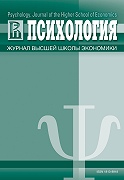Sensitivity to Communication Context in 3-4-Year Old Children during New Word Learning
Abstract
This research tests the hypothesis that 3- and 4-year-olds can use characteristics of a social context created by adults to learn new words. One of the strategies that a child can use in multi-party conversations is to decide to whom a message (and a new word) is addressed. The ability to do so may simplify word learning situations by making the learning selective and by reducing the amount of perceived words. In the current experiment we test children's ability to learn a new word from a natural conversation when the communicative context is kept constant and when it is altered by adding a new game partner. We predicted that children will differentially interpret verbal messages containing a new word as addressed to them or to the new person, and this will affect their ability to remember the new word. Children heard a new word in one of two conditions: when a communicative context shared with an adult was kept constant and when it has changed (a new adult joined the conversation). We found that 3-year-olds could learn new words only when the communicative context was constant, but 4-year-olds could learn new words in both conditions. A control condition revealed that these findings cannot be explained by task difficulty.
Downloads
References
2. Akhtar, N., Jipson, J., & Callanan, M. A. (2001). Learning words through overhearing. Child Development, 72(2), 416-430.
3. Callanan, M., & Sabbagh, M. A. (2004). Multiple labels for objects in conversations with young children: Parents’ language and children’s developing expectations about word meanings. Developmental Psychology, 40(5), 746-763. https://doi.org/10.1037/0012-1649.40.5.746
4. Carey, S., & Bartlett, E. (1978). Acquiring a single new word. Papers and Reports on Child Language Development, 15, 17-29.
5. Diesendruck, G., & Markson, L. (2001). Children’s avoidance of lexical overlap: a pragmatic account. Developmental Psychology, 37(5), 630-641.
6. Henderson, A. M. E., & Graham, S. A. (2005). Two-year-olds’ appreciation of the shared nature of novel object labels. Journal of Cognition and Development, 6(3), 381-402.
7. Landau, B., Smith, L., & Jones, S. (1998). Object perception and object naming in early development. Trends in Cognitive Sciences, 2(1), 19-24.
8. Markman, E. M. (1991). Categorization and naming in children. Problems of induction.Cambridge, MA: The MIT Press.
9. Merriman, W. E., & Bowman, L. L. (1989). The mutual exclusivity bias in children’s word learning. Monographs of the Society for Research in Child Development, 54(3-4), 1-132.
10. Mervis, C. B., & Mervis, C. A. (1982). Leopards are kitty-cats: Object labeling by mothers for their thirteen-month-olds. Child Development, 53, 267-273.
11. Moll, H., Carpenter, M., & Tomasello, M. (2014). Two- and 3-year-olds know what others have and have not heard. Journal of Cognition and Development, 15(1), 12-21. https://doi.org/10.1080/15248372.2012.710865
12. O’Doherty, K., Troseth, G. L., Shimpi, P. M., Goldenberg, E., Akhtar, N., & Saylor, M. M. (2011). Third party social interaction and word learning from video. Child Development, 82(3), 902-915.
13. O’Neill, D. K. (1996). Two-year-old children’s sensitivity to a parent’s knowledge state when making requests. Child Development, 67(2), 659-677.
14. Tomasello, M. (2008). Origins of human communication. Cambridge, MA/London, UK: A Bradford Book/The MIT Press.
15. Tomasello, M., & Haberl, K. (2003). Understanding attention: 12- and 18-month-olds know what is new for other persons. Developmental Psychology, 39(5), 906-912.
16. Vlach, H. A., & Sandhofer C. M. (2011) Developmental differences in children’s context-dependent word learning. Journal of Experimental Child Psychology, 108(2), 394-401.
17. Woodward, A. L. (2004). Infants’ use of action knowledge to get a grasp on words. In S. R. Waxman (Ed.), Weaving a lexicon(pp. 149-172). Cambridge, MA: The MIT Press.





